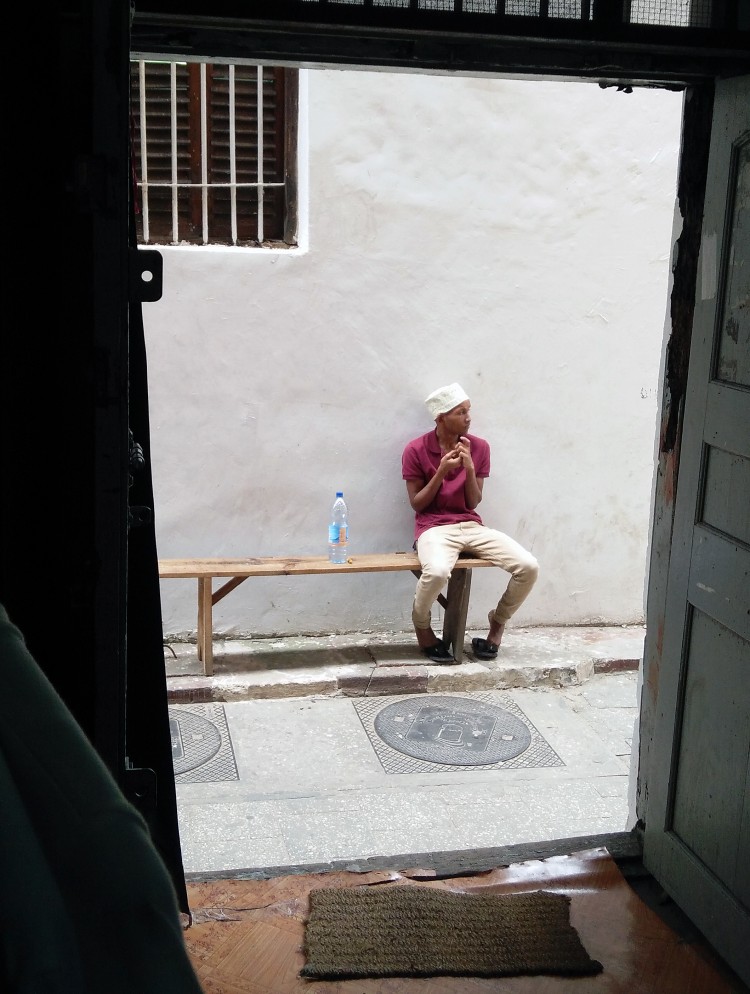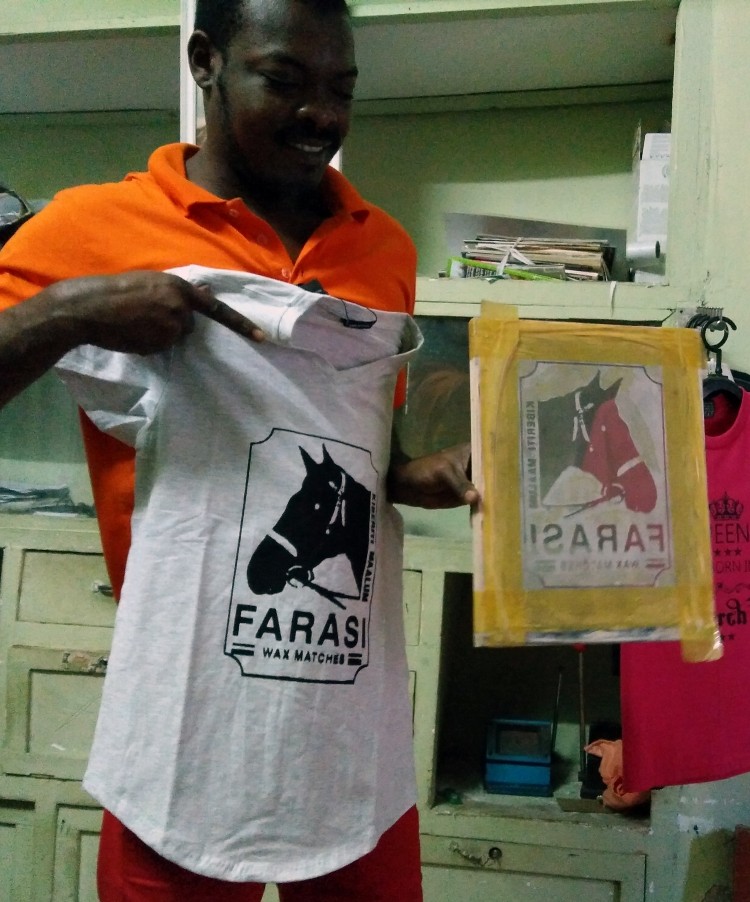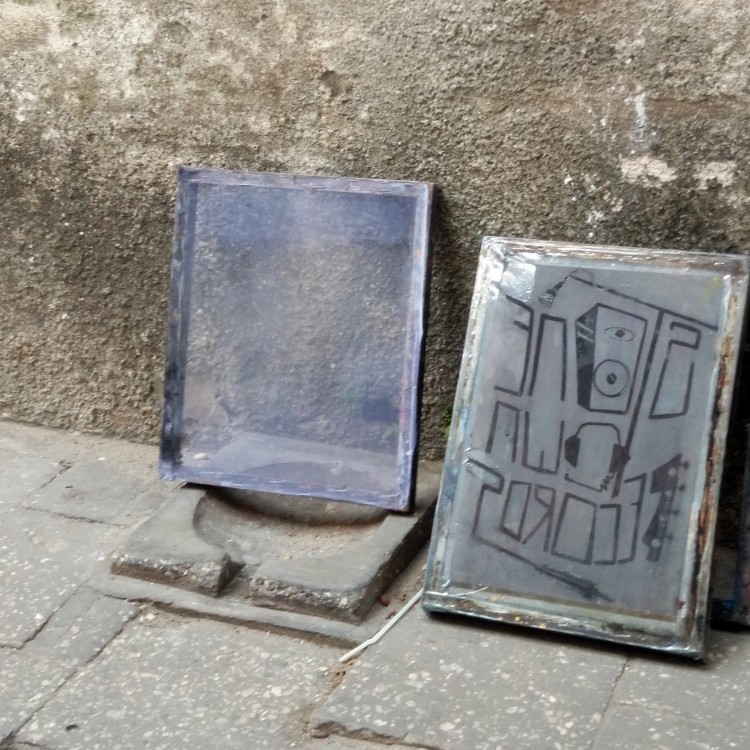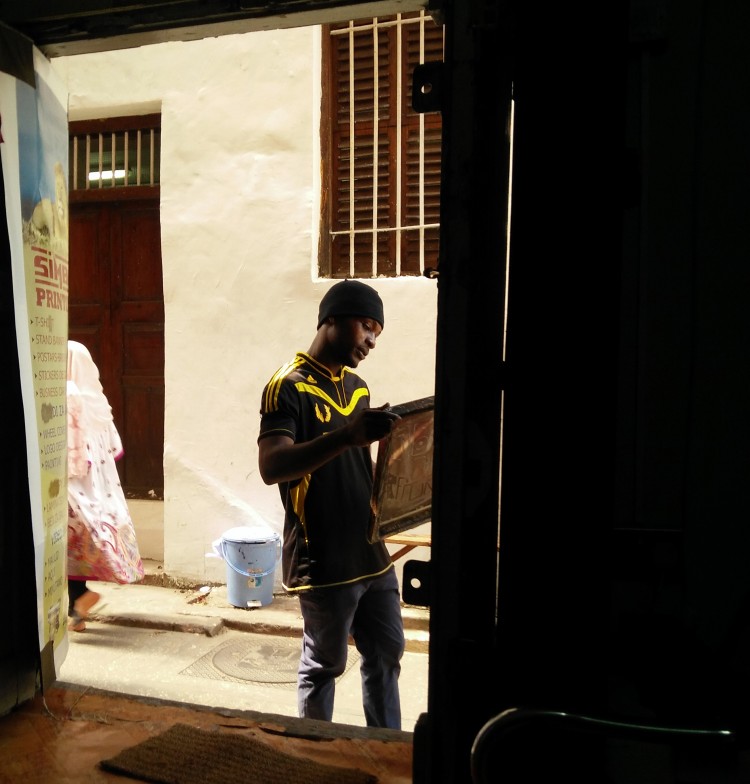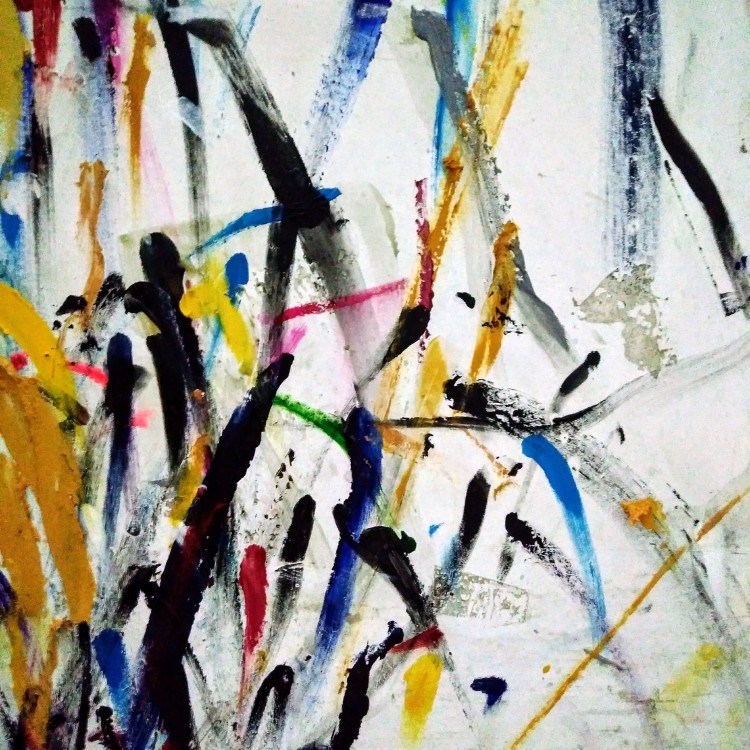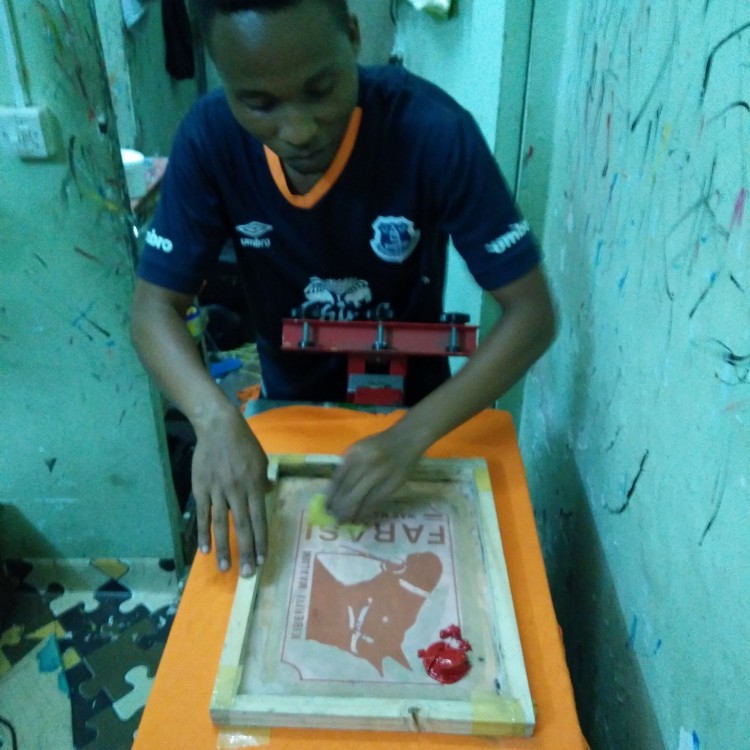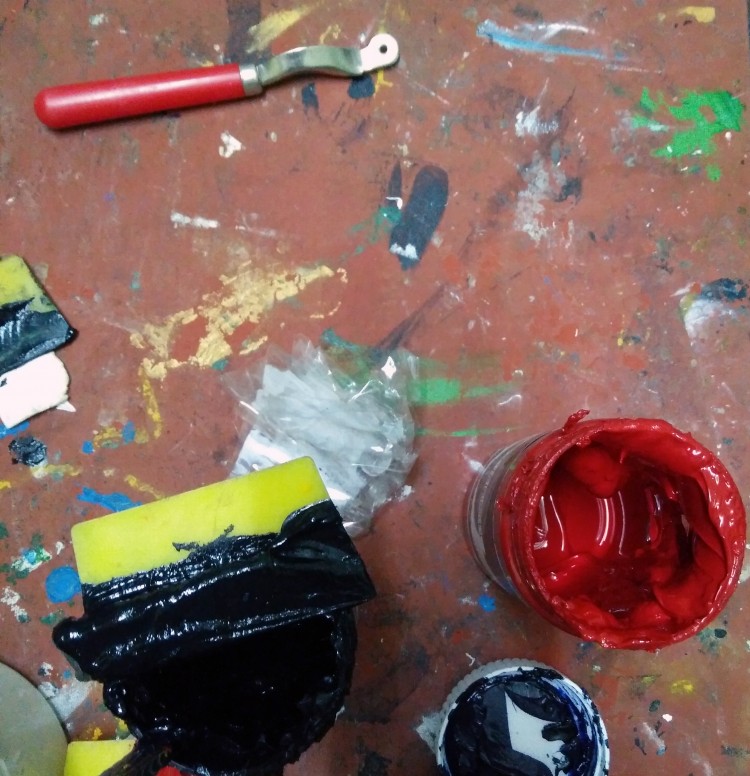Hold on to what you love
When you want to get a custom-made screen print on a piece of clothing, for example a shirt, a little shop nestled in a narrow street in the Old Town of Stone Town/Zanzibar, close to Darajani market, is the place to get it: Simba Printing. An interview with Meddi, Mkude & Co...
When you want to get a custom-made screen print on a piece of clothing, for example a shirt, a little shop nestled in a narrow street in the Old Town of Stone Town/Zanzibar, close to Darajani market, is the place to get it: Simba Printing.
It’s around lunchtime on a day end of August. I am sitting on the wooden bench in front of the small office. A friend of mine, Mkude (25) turns around the corner with a bowl of Urojo [1] (see footnote below) and his mischievous smile. A few weeks ago I had asked him if he and his colleagues would be happy to talk about their experiences and they agreed [2].
It’s always inspiring to have an honest conversation, to talk about different perspectives. This is a chat between friends and I invite you to come along. Mkude and Meddi, together with Aziza and Abdul are sharing their stories and personal perspectives on running a business in Stone Town and give an insight into the perks and challenges on their various paths of life. We will be joined by some more people as the interview enfolds – meet Coco, Dulla, and Ison - because after all, it was a normal working day at Simba Printing.
After Meddi finishes a design on the computer and Mkude his Urojo, we get to sit inside their office to start with the questions I had prepared!
Eva: Ok, so tell me a little bit about you, your profession, your age…? Who are you?
Mkude: I’m 25 and I am a chef, but I have been working here for 3 years now.
Meddi: My name is Ahmed, but my nickname is Meddi. I am 23 and I am specialized in finance management. But I am here to help my sister and to get more experience in working in the creative sector. And also to give our customers the chance to turn their ideas into something.
Eva: When did you start working here?
Meddi: I started about 1 year ago, but by that time I was already familiar with the business and the people here. I went to school in this neighbourhood and have known the family who owns Simba Printing for a long time. Abdul is 22 years old and he started working here 1,5 years ago. He and Aziza, who is 26 and started working here 2 years ago, are very busy with taxes today so for the first part of our chat they answered a few questions but couldn’t join us for all parts of the interview.
Eva: And are you all from Zanzibar?
Mkude: Yes, we are all from Zanzibar; not just Stone Town, but different parts of Unguja Island [3].
Eva: What’s the story of Simba Printing, when was it started and what do you do?
Meddi: The person who started this business was our brother called Haji Simba. He just started with printing graphics. But then some people asked him if he could use his talent to print T-shirts. So, the core business was printing the pictures, he opened the shop in 2010. Today it is still his families’ business, but it is specialized in printing t-shirts for example for weddings, events, schools and universities.
Eva: Like the badges for the uniforms…
Meddi: Yes, like the badges. But also merchandise, business cards,… hotels work with us, we do logo design…
Eva: What’s the type of printing you do on the t-shirts called again?
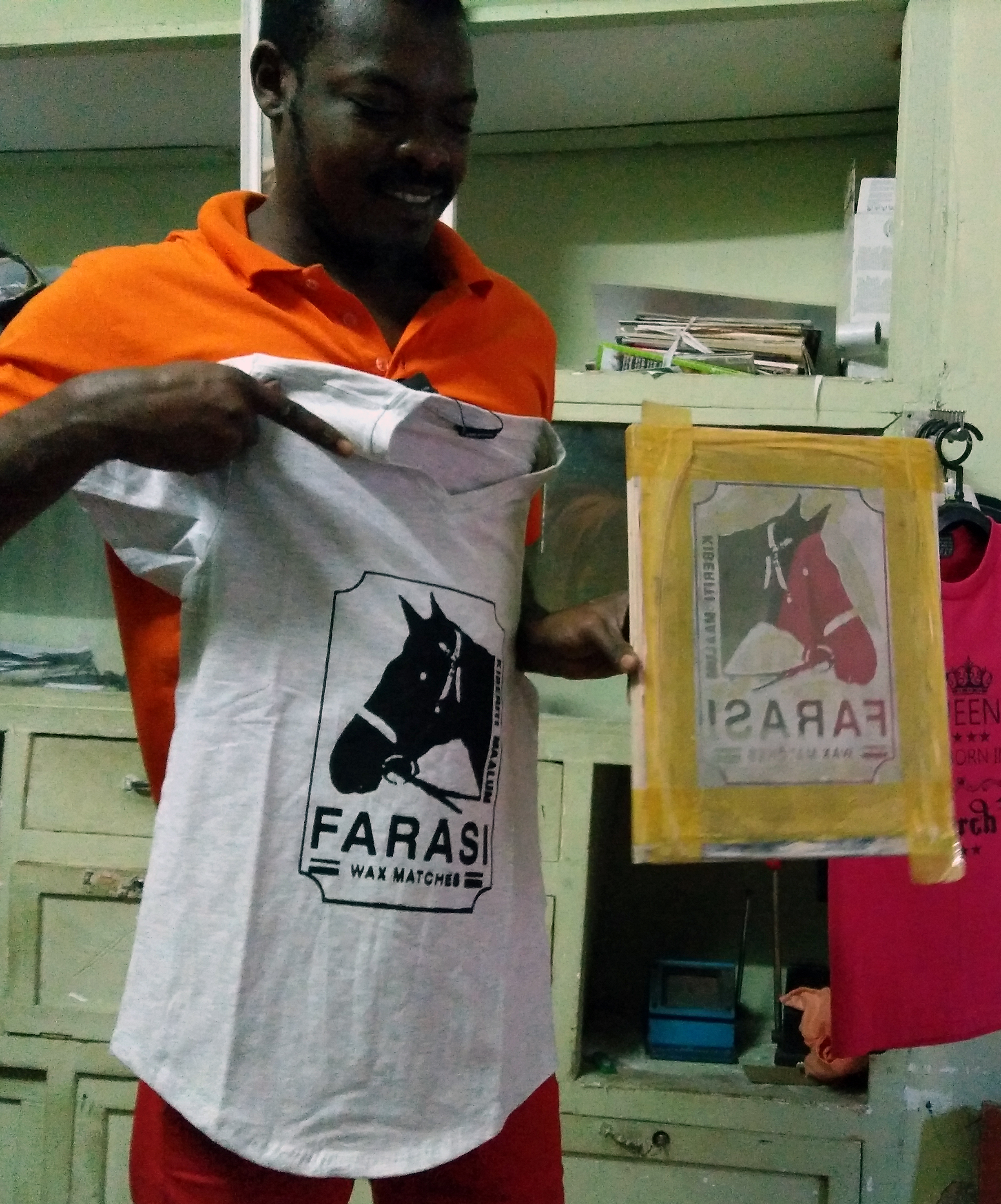 Mkude showing a sample frame with the finished product [Foto von Eva-Maria D., Eva-Maria D.]
Mkude showing a sample frame with the finished product [Foto von Eva-Maria D., Eva-Maria D.]
Mkude: Screen printing. We build a frame, make a screen and then print in all colours. We also provide the shirts.
With its wide, open doors, the shop always welcomes visitors and customers and many people pass by, greeting. Like Dulla just now. Dulla is a fashion designer and tailor, known for his distinct style.
He’s a good friend of us and Simba Printing is also collaborating with him. Dulla might design and a piece of clothing and the team here adds a print. I always like Dulla’s personal style and today he’s wearing a shirt with kitenge fabric on the rims of the sleeve and the word ‘tailor’ stitched on its back.
Eva: You told me the shirt-printing is your bestseller so If you were to wear one shirt with a print for the rest of your life, which print would you choose? Like Dulla, who chose to stich his passion for design and tailoring on his shirt. Which print, or writing would define you two?
Mkude: For me it would be the Stone Town Records - label. We do the t-shirts for the local record studio which supports artists of Zanzibar here. It means a lot to me, because firstly, it’s a really nice design and secondly it represents my community and friends.
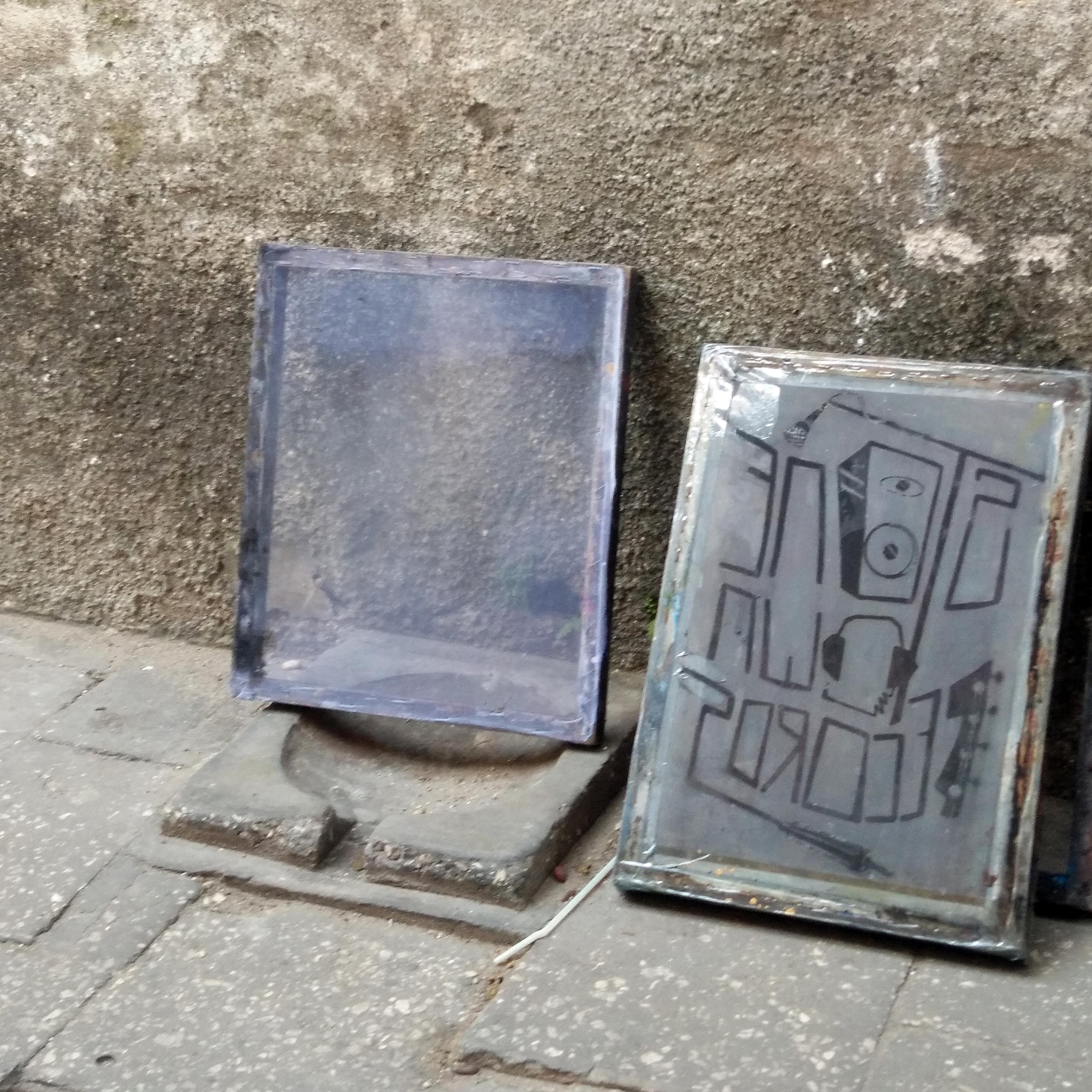
Meddi: ‘Me and you are not the same bro’ – I got this from the artist Wizkid, he’s from Nigeria. It’s the lyrics of a song [4].
Eva: What does it mean to you?
Meddi: People in general often see a group of people and they think they are the same as a culture, what you are wearing, your values. But in reality, everybody has his own way of thinking, everybody has his own personality and identity.
Eva: How do you know each other?
Mkude: We have another brother who is from Hajis family and I used to work with him in a restaurant in Malindi (Stone Town) in the Old Dispensary. When it closed I started working here at Simba Printing.
Meddi: Haji Simba is a friend of my family and when I used to go to school around the corner I often passed by his shop, greeted him and he always supported me.
Abdul: I am doing an internship, I am also doing a certificate right now at the SUZA [5] , I study agriculture.
Aziza: I learned about Simba Printing during a field day from school and afterwards I started working here part-time.
While we talk, Ison, Hip-hop artist of Stone Town Records, the record label Mkude talked about, enters. He had ordered some shirts for his merchandise and wanted to quickly drop in for an update. We take a short break as they are talking about the order and he sits down next to us. They decide to give an old frame a makeover and to print one shirt again in another colour.
Eva: What are some of the challenges you face in the business, but also advantages?
Meddi: There are some obstacles, but not many. An advantage is that we don’t have a strict hierarchy. We are all about the same age, we talk about the schedules and jobs that need to be done.
Mkude: Yes, everybody can be flexible, which gives a lot of freedom. It provides a good work environment.
Eva: What are some of the challenges you face?
Mkude: It’s important to have good communication with customers – sometimes they don’t know what they want. Then we advise them.
Meddi: There are many types of customers. Some, for example, they are just talkative. You sit down with them, you help them with their ideas, design, but in the end, they leave without buying anything.
Ison: They need to ask customers: ‘What do you want?’ And take notes.
Meddi: This is what we do and also, when they place an order we write down every detail. In case people come back and say: ‘Oh this is not the colour I wanted’, you can show them and tell them: ‘Yes, this is what you said on that day’ and they can be reminded.
Ison: The good thing is, they really know which colours work well together. I always support their work.
Mkude: Another challenge is getting material: Stickers, colours, a lot of things you can’t get on the island. We even have to transfer material, so people bring it to us from Dar.
Meddi: And if the machine for the printing breaks down, we have to order from outside the country. So, it takes a lot of time.
Ison: Maybe you should have a second one, just in case.
Mkude: We don’t have the money to invest in another machine.
Meddi: One machine costs around 2 million shillings. It’s difficult to buy another one and then to maintain two.
Mkude: We have a lot of competition nowadays.
Ison: Yes, even their neighbour there is printing.
Meddi: But what is helping us: A lot of people have known us for a long time, we have good service, good branding.
Ison: It doesn’t matter if many people do the same thing. There is always something that you can do differently and better. These guys are creative, they have the best service.
Eva: I guess it’s the same with your music, a lot of people make music, it doesn’t have to be a competition for you. You can succeed in your own way.
Ison: Yes, exactly. You can be unique.
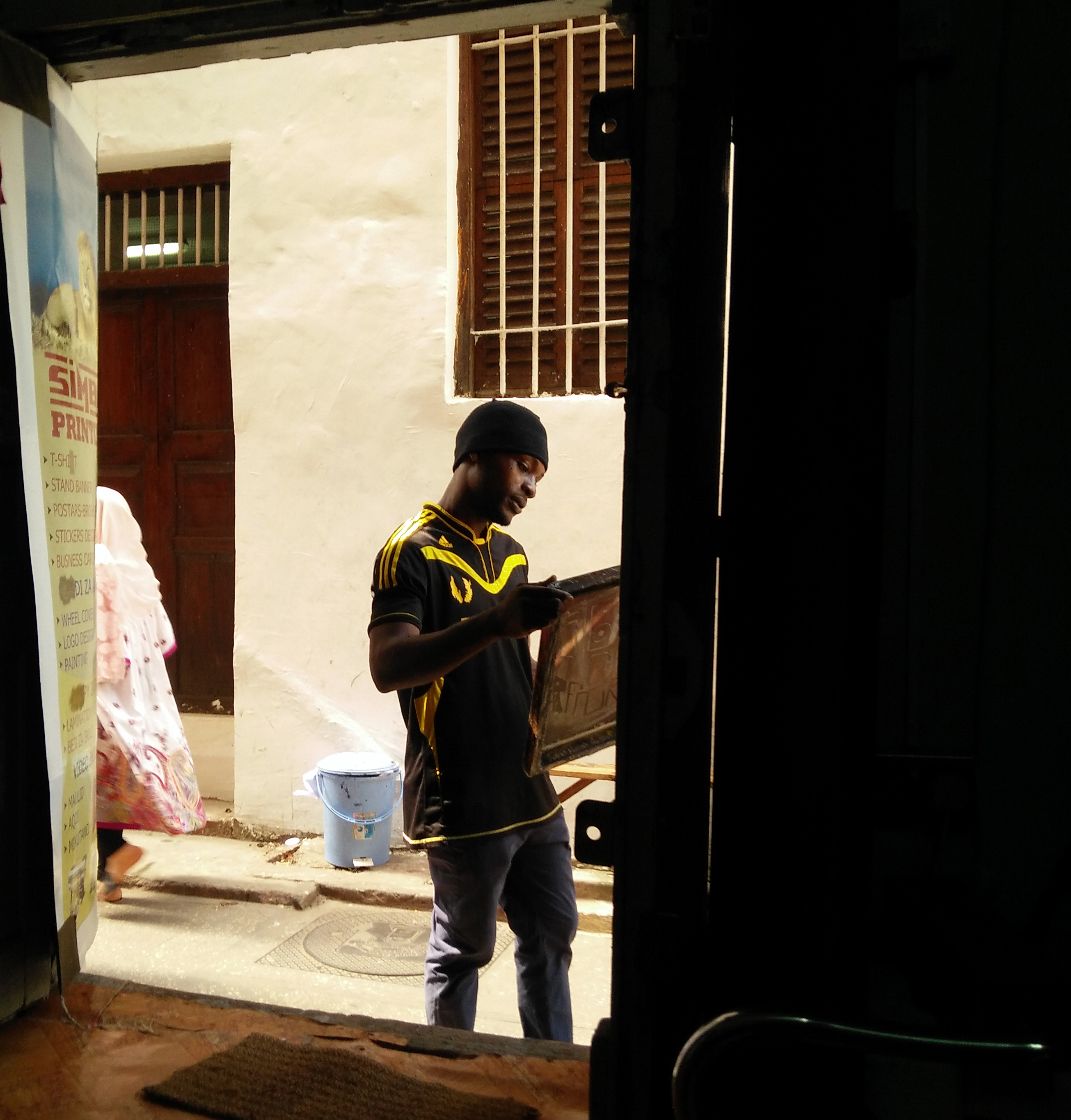 Ison checking one of the screens. [Foto von Eva-Maria D., Eva-Maria D.]
Ison checking one of the screens. [Foto von Eva-Maria D., Eva-Maria D.]
Meddi: And we make money from the business. We all have permanent salaries; the interns have their allowances. But sometimes unexpected costs may appear. For example, the issue of changing government laws. Some officials come here, they say taxes have increased. Others came and said we had to pay something extra from 2016-2018. So that’s a big problem because we have to pay this unexpected amount.
Eva: With some of the challenges, there is not really a way around it.
Mkude: Yes, and for the other challenges, like the issue of competition - we started to do more advertisement: Via e-mail, facebook,…
Meddi: We now have flyers which we contribute, and posters.
Eva: And would you say working in a family business, or where you know the owners like you are part of their family, is a challenge itself?
Meddi: No, it’s very good to work in a family business. Everything is transparent with the family, what is going on, the cash flow etc.
Ison: As a family you can quickly solve problems, as friends you can sometimes fight, and it might be a problem. – Sorry, Eva, please give us a second to check this frame again, me and Mkude. Maybe you continue with Meddi.
Eva: Sure - Meddi, can you tell me something about your last jobs and background, and what it taught you?
Meddi: My last job was in a bank, working in accounting, bank services. All these things are very useful even if you don’t work in a bank anymore. Especially how to interpret information. For Mkude – of course he still knows how to cook.
Ison: Oh yes, he really knows how to cook good food.
Eva: I think you often choose a job, you choose to study something you want to do but then you have to work in a completely different area to support yourself or also your other journey. And if you are lucky, your previous job might have helped you to gain skills that you can still use to make money, maybe even support the job you would like to do.
Mkude: People often have to work in another job, just to survive.
Meddi: Maybe sometimes you have to get a second or third job, or a different profession. Or even a job for the night.
Ison: They work during the day. And then the next job at night.
Meddi: This is how our life is crazy. Like… how can I explain it? Like for example you can find someone with a degree in mechanics but he’s working in sports. Or you have a PhD in finance, but you find yourself working at the market. You have many people like this in Zanzibar.
Ison: When you ask the boda boda [6] driver, he will tell you he has another profession, but that he can’t find another job.
Eva: It’s difficult. It’s like you somehow have to find this plan B because plan A doesn’t work out, there are no opportunities. But let’s imagine tomorrow everything is different and you would all pursue and live your plan A. Can you share your plan A? How would tomorrow look like for you Mkude?
Mkude: I would be a chef with my own restaurant. I would serve all types of food, local food, Italian, rice dishes, nice seafood, vegetarian options for you Eva.
Meddi: My plan is to work in a company. I chose finance as a study because this is what I eventually want to do. But until I can find another job, Simba Printing is where I work.
Ison: I would have my own record label, support local artists. I am trying to do something different as a violinist, I produce, I am a DJ. And there are so many more talents who need support, so I would give them the opportunities they deserve.
Eva: Getting quality education and a job is a big challenge for your generation here. What’s something that needs to change in your opinion, what would you tell politicians?
Mkude:Our political leaders need to be serious about their duties and responsibilities.
Meddi: In each aspect. We need programs or a project for young people who finish school. Special consulting, a placement in a company, internships. So many people have really good ideas and are innovative, but they don’t have the financial needs to do something with it. There should be programs where the government can provide skills on how to open a company or they could even support financially, like with a start-up-budget.
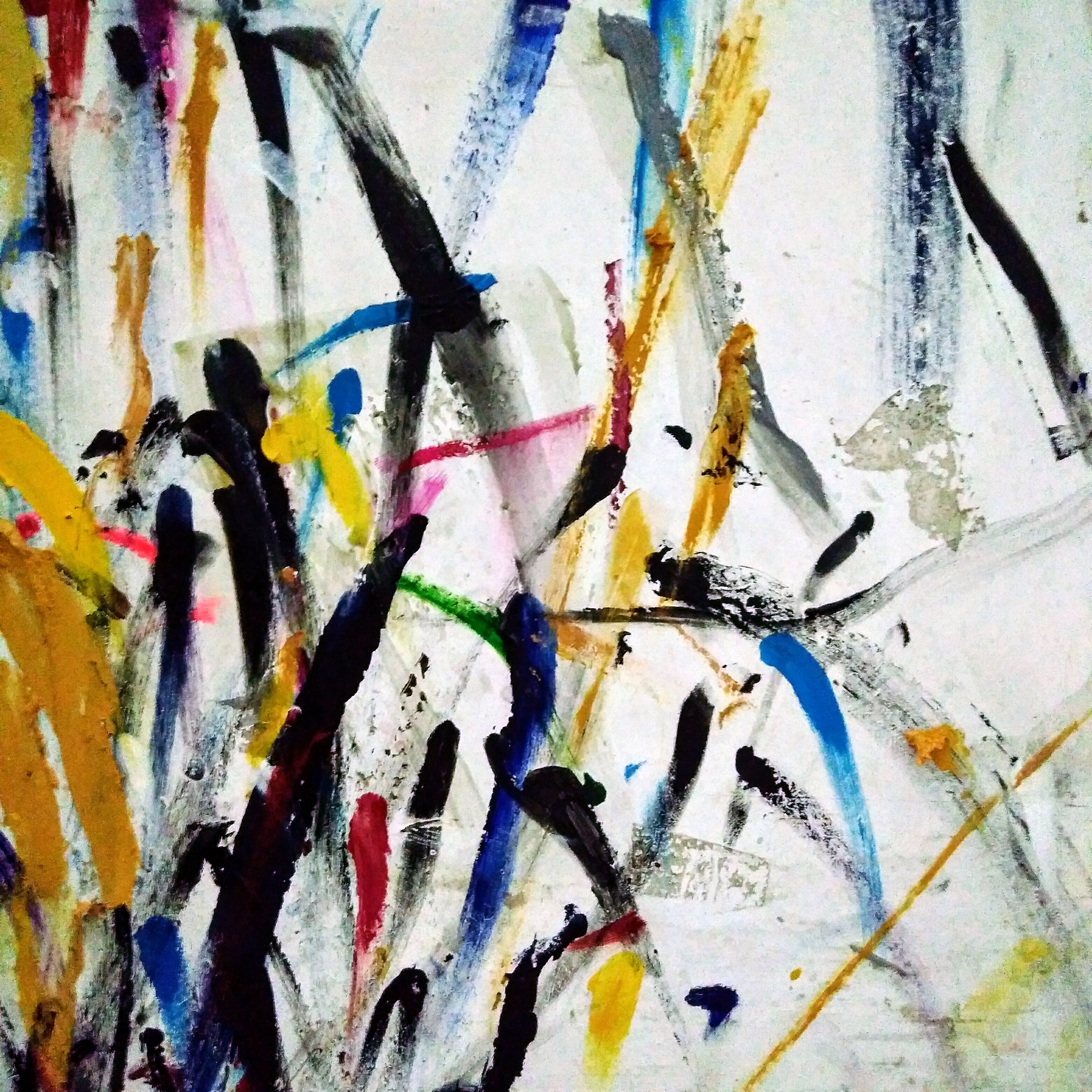
Eva: Do you feel like you have a voice in politics, or are you politically active in a party?
Meddi: I am not interested in politics. But I vote of course.
Mkude: No, I am also not interested. It’s dangerous if you engage in politics.
Eva: What do you mean?
Meddi: A lot of people fear to engage in politics. Because then you play with probability. You have a 50% chance to not have any more insurance to life, or you can live. There is this example of one politician. I will not mention his name. But from mainland Tanzania. Maybe after 2 years of him being a politician, they mixed poison in his food. Eva, it is very dangerous. You can make good money, but your life becomes a risk and you better make sure to hold on to the things you love.
Eva: That sounds very dangerous… But ok, let’s say it would be safe and you could be a leader, what would be the first thing you would change?
Meddi: A lot of things which are in the constitution you cannot change but I would introduce a programme that would help young people who are jobless. For example, on mainland, Magufuli[7] nowadays creates internship placements. I would help by providing social services. A lot of people demand them, but the supply is very low. Like health insurance. Another issue is using the raw materials we have in the country. To create new job sectors. It’s an opportunity. So, politicians need to focus on that, not on buildings nobody needs, and nobody wants, where there is no investment, no profitability.
During our chat, time went by so fast and I had to leave their office to go to a meeting. But a few days later, on a Thursday afternoon we continued; Mkude and Meddi are working in the office when I arrive.
Eva: Thanks so much, I have a few more questions for you, thanks for taking the time again. Last Monday we already talked a little bit about needing a plan B, and the challenge to find a job that supports you. What are 3 things you wish to have in your life right now?
Mkude: I think money first, then I would open a business - my own restaurant, then I would slowly build a house.
Eva: So, I guess working to achieve your goals plays a big part in your life. What else is important for you?
Meddi: Because I am a Muslim, my faith plays a big part in my life. I want to be aware of my religion and to be able to perform all my responsibilities. I want to help my family in economic issues. That’s why I work hard, I took a long time to study different things. I want to have a good life, this pushes and inspires me, and I think then other things stay more constant. You can help your family, keep your siblings in school. There is a time when your parents cannot do everything alone anymore.
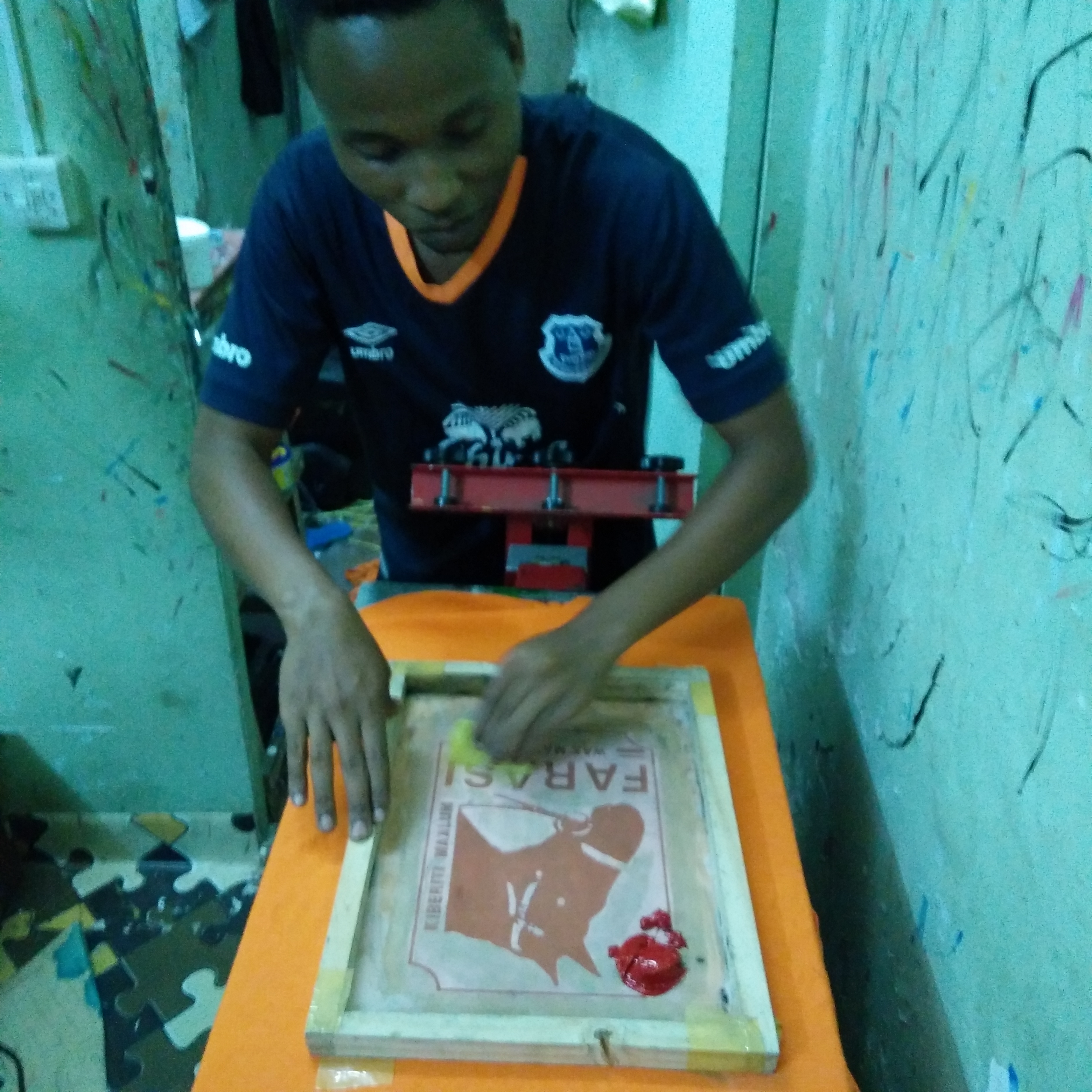 Meddi applying the colour on screen and shirt [Foto von Eva-Maria D., Eva-Maria D.]
Meddi applying the colour on screen and shirt [Foto von Eva-Maria D., Eva-Maria D.]
Eva: This is very inspiring, thanks for sharing. I have another question: When will you all get married?
Mkude: Oh Eva, all the other questions were easy.
Meddi: Ohoh, this is a big question. The reality is: for now, I am not ready. Maybe until I get a good job. I need to be able to support a family first.
Meddi: People say, the soap of life is money. If you have soap, you can wash everything. Even rust goes away.
Mkude: Right now, I am not able to wash.
Eva: But if you had a girlfriend you can only introduce her to your family if you were to marry her soon, is that correct?
Meddi: Yes.
Eva: But your parents are your parents, they would know if you had a girlfriend.
Meddi: Yes, of course they would know, and I am mature enough, but they would pretend to not know until I am able to provide the bride price. It’s difficult. I already wrote a business plan, for engaging in agriculture business. But my uncle said he can’t provide me with money to invest, even though it was a good plan.
Eva: Mkude, what are the goals you chase right now?
Mkude: I need to be strong, so I can work hard. A want to have a family, a wife, two children. My friends are very important for me. And to have money, because if you have money, you don’t have stress.
Eva: So - at the moment you all feel like you have a lot of stress?
Meddi: Yes, now we feel like we have more stress, because now we are in that age where our families are asking for support so it’s very bad if we can’t.
Eva: You both are trying to be very positive with your attitude. You are welcoming, you care for other people… What has shaped this outlook?
Mkude: Life taught us, life changes people all the time. And the good thing is, if you let life teach you, you become a wise person and can help people, and also people will help you.
Meddi: You should have good manners.
Eva: It’s true.
Meddi: Also, our families shaped us, our background.
Mkude: Sometimes other kids are not lucky, they have harsh parents.
Meddi: And some become street children. So, our families helped us, and also our faith.
Eva: What do you love most about living on Zanzibar?
Mkude: I like the peacefulness of Zanzibar. But if I could, I would like to live in Europe. To change life.
Meddi: There are a few things I like. First of all: Freedom.
He starts singing: “Freedom is coming tomorrow….” It’s a song from the movie Sarafina[8].
Meddi: It depends. I like living on Zanzibar, but I am dependant on the job. So, if I get a job on the mainland, I would go there.
Eva: My final question is: What piece of wisdom would you give somebody? Maybe about business, work, or life in general.
Meddi: If you want to help someone, you should know everything about him or her. So, I would ask a lot of questions to get to know them. If you know somebody or more about the issue, you can advise in a better way. So, it depends.
Eva: Wow, I think this is something I will take away from this – among many other things. There is not one advise that fits everybody.
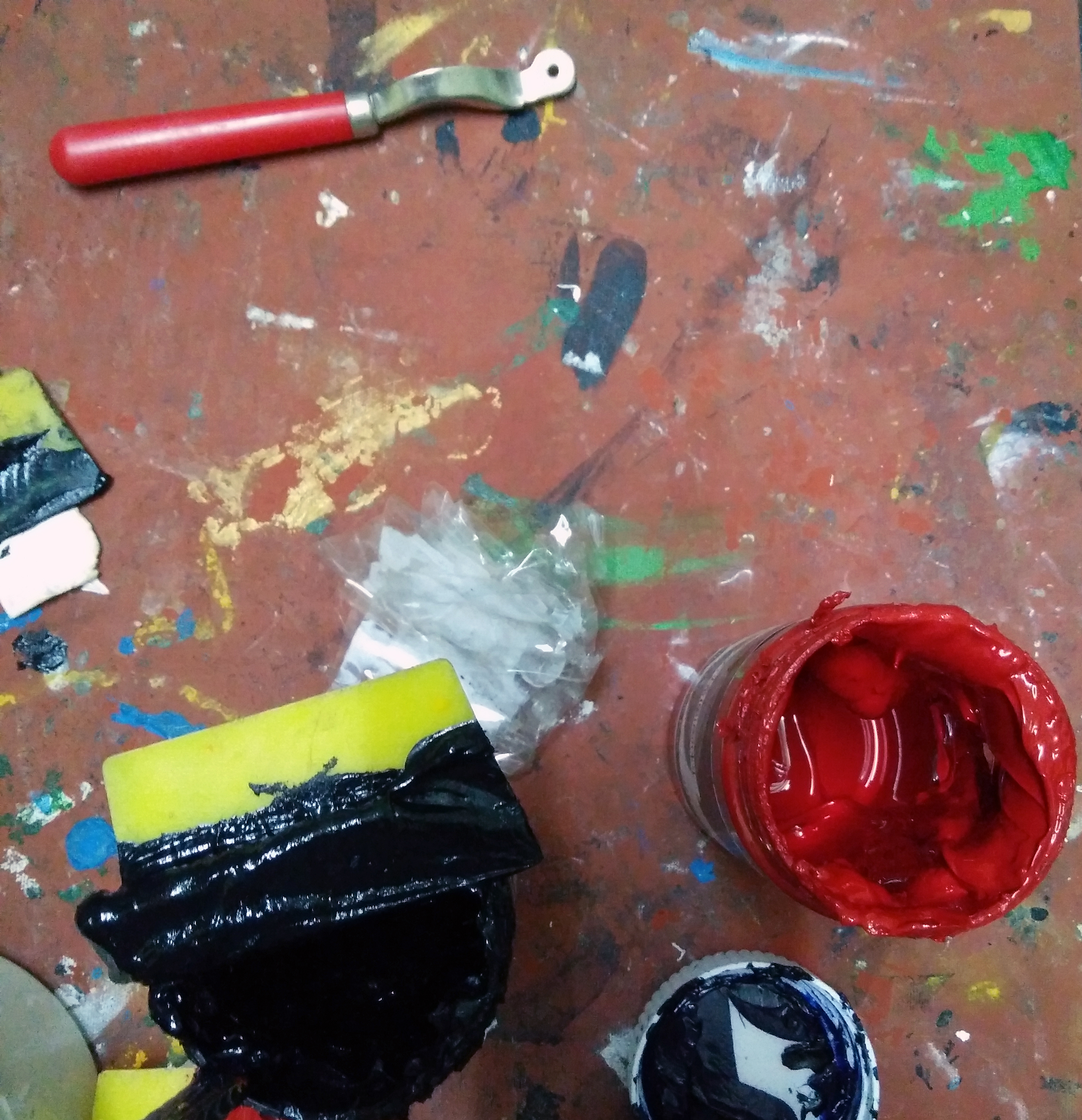 Various paints for printing [Foto von Eva-Maria D., Eva-Maria D.]
Various paints for printing [Foto von Eva-Maria D., Eva-Maria D.]
It’s already dark outside but you can still recognize the people passing by. And of them is our friend Coco.
Eva: Coco – you come at the right time.
Coco, one of Zanzibar’s beloved reggae artists enters the office and we all greet each other.
Eva: Do you have some time? What is your piece of wisdom?
Coco: Wow, there are a lot of things, I have to think about it.
Meddi: You are now in an interview.
Coco: Live your life and love your life.
Eva:Yes.
Coco: You think that’s bad advice?
Eva: No, not at all.
Coco: Because in life you have a lot of troubles. I would say: love your life, live your life.
Eva: Sometimes I don’t know which one should come first.
Coco: Love your life first, then you must live it. I don’t know if it’s nice wisdom.
Eva: Who am I to judge your wisdom? Sometimes I just don’t know if you can always choose your mindset. For some it’s easy to love and to live life.
Coco: I see what you are saying here…. Yes, in life we have a lot of troubles. You still have to solve problems. But while you work hard, don’t forget to love and live your life. This is what I am saying. Don’t lose a positive outlook. But there are good people around us.
Eva: Wow guys… I can’t tell you how much I appreciate all of your answers and our conversation. For being so honest and sharing all this with me. Thank you!
Coco: Ok… so what is happening here? What interview is this….
Footnotes:
[1] One of Zanzibar’s most delicious and famous dishes. You can find recipes and photos online.
[2] We spoke Kiswahili and English and I decided to translate everything into English. Make sure to check the foot notes for additional information
[3] Zanzibar
[4] Emtee ft. Wizkid & AKA – Roll it up
[5] State University of Zanzibar
[6] Boda Boda is the term for motorcycle taxis in East Africa.
[7] Dr. John Joseph Magufuli is the President of Tanzania, in office since 2015.
[8] The movie Sarafina! The Sound of Freedom (South Africa, 1992) depicts students involved in the Soweto Riots, in opposition to apartheid.
